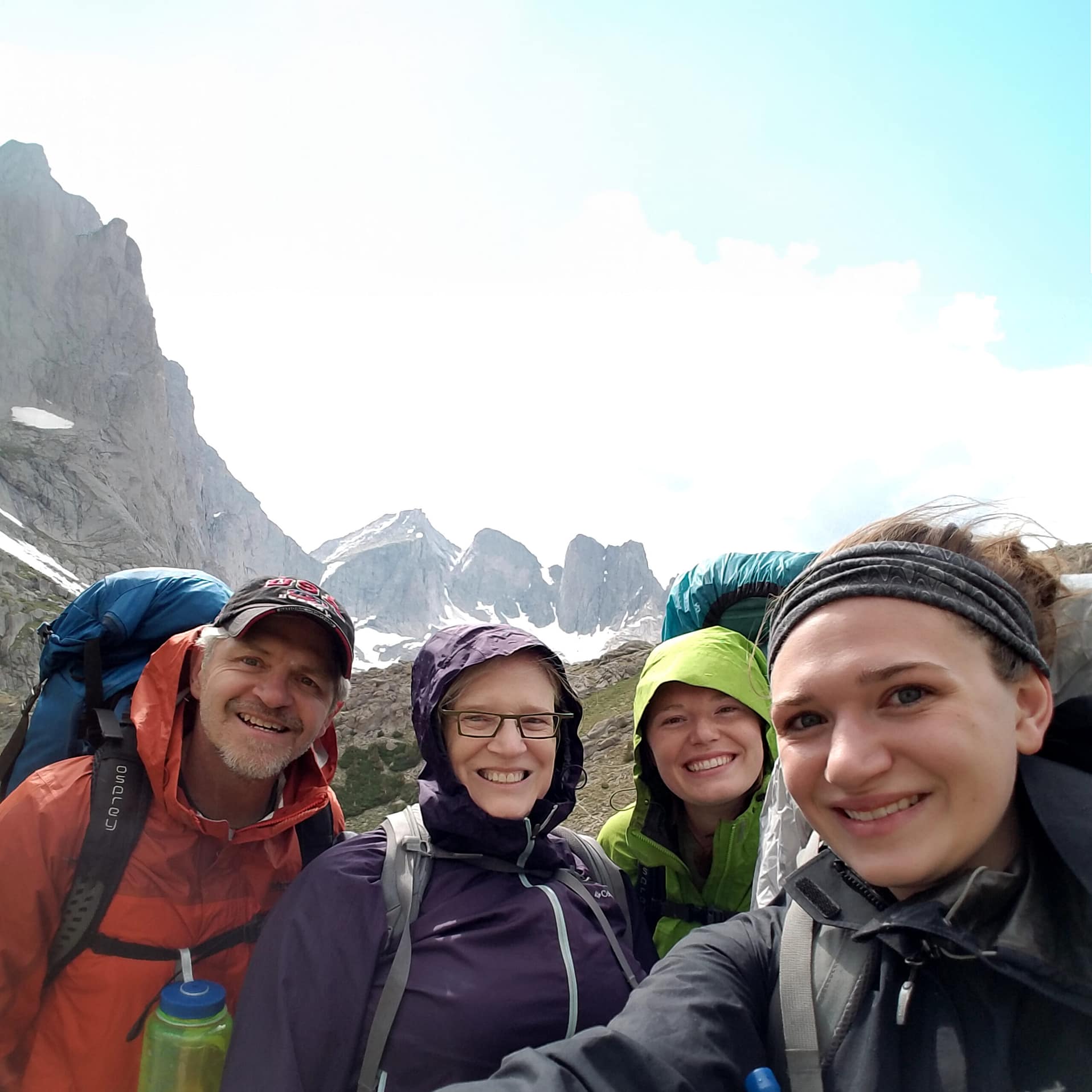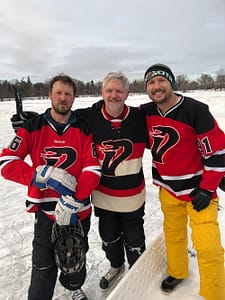
Tom shared his story in January of 2024.
It’s ironic. In college I worked in an artificial language laboratory developing software to help people speak through the computer when they couldn’t speak on their own. Forty years later, I’m pretty close to needing to use that (much improved) technology myself.
At the end of 2021, I started experiencing trouble speaking and swallowing. As a lifelong fan of ice cream, I would meet my adult daughter for ice cream regularly, but I found that ice cream wasn’t as enjoyable. Then, while playing ice hockey, I had a choking fit from drinking water twice during the game. When the other team scored a goal, a player on my team accused me of being out of position. As I tried to curse at him, I couldn’t get the words to come out. I just couldn’t push the breath out. That cemented for me that there was something seriously wrong. I soon saw my doctor, and through a series of various tests and meetings with multiple doctors at different hospitals, almost a year later I received a diagnosis of bulbar amyotrophic lateral sclerosis (ALS).
The bulbar variant of ALS means that my speech, swallowing and lungs are first affected, then my limbs. My voice is strained and hoarse, and I can’t speak fast or loudly anymore. If I’m at a party, I’m not able to engage in conversations as much as I want. l love to joke around, so that’s tough for me. The disconnect in speaking is hard, and it’s going to get worse. I also historically love literally every type of food, but now I have a new experience of not enjoying many foods. Eating is difficult, painful and problematic. I recently had a feeding tube inserted after initially rejecting the idea. There’s no enjoyment with eating via feeding tube, but it’s a lot less annoying than choking on food all the time. However, I still have ice cream every week. I haven’t given up hope on that!

Tom Albin and two teammates suited up for a hockey game.
Thankfully I’m not having any trouble breathing yet, and no weakness in my limbs. In fact, I still play on two ice hockey teams. Growing up in the Midwest, hockey has been a huge part of my life, and I’ve been active in the sport since I was a teenager. Ten years ago, I had blood clots in my lungs and was in the hospital for a week. When my doctor said, “You almost died, and you may not play hockey again,” I was more upset by the prospect of not playing hockey ever again than the prospect of dying.
For now I’m able to take care of myself, but it’s a matter of time before ALS robs me of most of my autonomy. It’s very daunting to know that it’s there and it’s coming and there’s nothing I can do to stop it.
Nevertheless, I’m still very much enjoying life. I LOVE life. Aside from watching and playing hockey, I love listening to music and taking walks in nature. Last year I got to see two of my favorite punk bands — Bikini Kill and X. I meet up with friends about four days out of the week for a meal, coffee or a beer. I’ve been very blessed that my friends have stepped up so that I don’t feel alone, even though ALS is commonly a very isolating disease. I’m down to my last three states to visit; all that are left are New Mexico, Oklahoma (where my wife and I look forward to visiting the Bob Dylan Museum) and Alaska. Alaska will be my 50th state, where I plan to hike with my family this summer. So I don’t want it to end, but I don’t want to go on when there’s no good left. I cherish quality of life over quantity of life.
I’m willing to negotiate what interventions are acceptable as my disease progresses. When I first met with my healthcare team, they explained the symptoms to expect down the line, and they said that I might need a feeding tube. I immediately shut down the idea, “If I can’t eat, that’s not quality of life.” I’ve since changed my mind. My life is much better with the feeding tube. I can take in nutrition, and I stopped losing weight, which is the biggest tool in my toolbox because weight loss is directly correlated with faster functional decline.
But my life is becoming more of an inner life than it’s been, and at some point I can imagine being in a situation where I’m limited to a chair, so I’ll just be able to read books on the computer, listen to music and watch movies. It’ll be a different kind of enjoyment than when I play hockey. After every hockey game, I skate around the rink and just feel the joy of ice skating. It means a lot to me. Losing that will be hard.
I have a friend from my ALS support group who said, “Everything gets harder, and then impossible.” This disease is long-term torture; it holds you down as a hostage. I want to be in control of my situation to the degree that I can be. I want to avoid excessive torture, and unnecessary angst and pain in my last days. To just have that little bit of control in the end to decide, “OK, enough is enough. I’m taking over,” means a lot to me. That’s why I want the option of medical aid in dying here in Minnesota.
We have a daughter who lives in Washington, where medical aid in dying is available, but my wife and I don’t want to leave Minnesota. It’s been our home for 35 years. It’s where we’ve built our community and social support, and it’s where my medical team is. It doesn’t make sense to leave my home just to have some say in the last stretch of my life.
I want my family to think: He had a good life. He had control. He was able to see the 50 states, and he was able to do some things he wanted to do. What I don’t want is for them to be filled with traumatizing memories of a prolonged death, with me doped up on pain meds, no longer myself. That’s tough for me to think about.
I’m not afraid of death, but the act of dying scares the hell out of me. I don’t want it to be a drawn-out process, and that’s the thing with ALS — it’s basically dying in slow motion. It would be considerably more humane for me to spend quality time with my family and move on to whatever is next once my suffering is insurmountable, to have the ability to say goodbye to my loved ones when we know it’s goodbye. Not having the minimal control of escaping the very last few months of pure torture is my biggest fear.
If you agree with Tom that terminally ill Minnesotans should not have to suffer, contact your lawmakers today.
Mail contributions directly to:
Compassion & Choices Gift Processing Center
PO Box 485
Etna, NH 03750